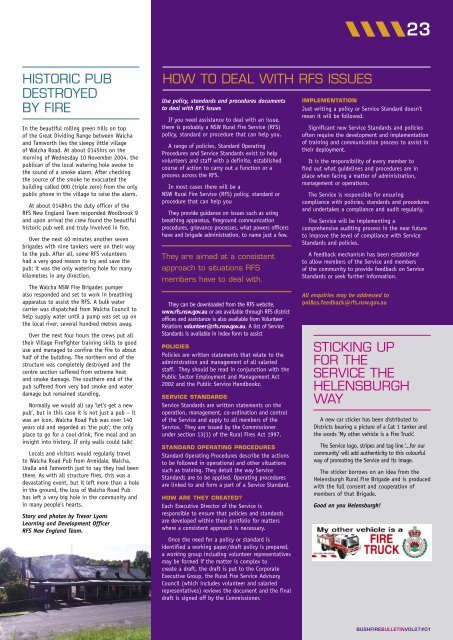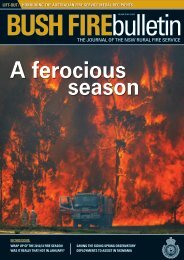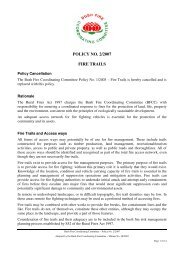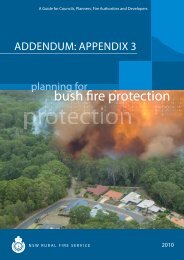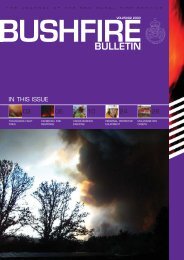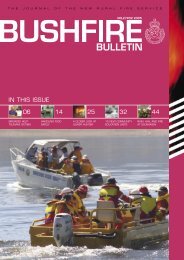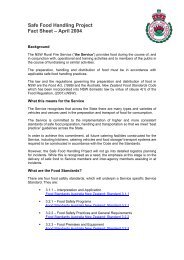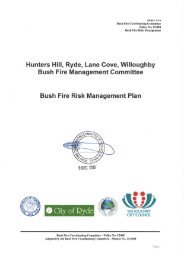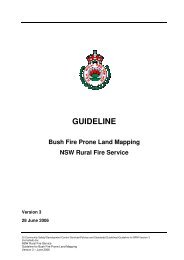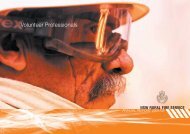to view - NSW Rural Fire Service
to view - NSW Rural Fire Service
to view - NSW Rural Fire Service
Create successful ePaper yourself
Turn your PDF publications into a flip-book with our unique Google optimized e-Paper software.
23<br />
HISTORIC PUB<br />
DESTROYED<br />
BY FIRE<br />
In the beautiful rolling green hills on <strong>to</strong>p<br />
of the Great Dividing Range between Walcha<br />
and Tamworth lies the sleepy little village<br />
of Walcha Road. At about 0145hrs on the<br />
morning of Wednesday 10 November 2004, the<br />
publican of the local watering hole awoke <strong>to</strong><br />
the sound of a smoke alarm. After checking<br />
the source of the smoke he evacuated the<br />
building called 000 (triple zero) from the only<br />
public phone in the village <strong>to</strong> raise the alarm.<br />
At about 0148hrs the duty officer of the<br />
RFS New England Team responded Woolbrook 9<br />
and upon arrival the crew found the beautiful<br />
his<strong>to</strong>ric pub well and truly involved in fire.<br />
Over the next 40 minutes another seven<br />
brigades with nine tankers were on their way<br />
<strong>to</strong> the pub. After all, some RFS volunteers<br />
had a very good reason <strong>to</strong> try and save the<br />
pub; it was the only watering hole for many<br />
kilometres in any direction.<br />
The Walcha <strong>NSW</strong> <strong>Fire</strong> Brigades pumper<br />
also responded and set <strong>to</strong> work in breathing<br />
apparatus <strong>to</strong> assist the RFS. A bulk water<br />
carrier was dispatched from Walcha Council <strong>to</strong><br />
help supply water until a pump was set up on<br />
the local river, several hundred metres away.<br />
Over the next four hours the crews put all<br />
their Village <strong>Fire</strong>fighter training skills <strong>to</strong> good<br />
use and managed <strong>to</strong> confine the fire <strong>to</strong> about<br />
half of the building. The northern end of the<br />
structure was completely destroyed and the<br />
centre section suffered from extreme heat<br />
and smoke damage. The southern end of the<br />
pub suffered from very bad smoke and water<br />
damage but remained standing.<br />
Normally we would all say ‘let’s get a new<br />
pub’, but in this case it is not just a pub – it<br />
was an icon. Walcha Road Pub was over 140<br />
years old and regarded as ‘the pub’; the only<br />
place <strong>to</strong> go for a cool drink, fine meal and an<br />
insight in<strong>to</strong> his<strong>to</strong>ry. If only walls could talk!<br />
Locals and visi<strong>to</strong>rs would regularly travel<br />
<strong>to</strong> Walcha Road Pub from Armidale, Walcha,<br />
Uralla and Tamworth just <strong>to</strong> say they had been<br />
there. As with all structure fires, this was a<br />
devastating event, but it left more than a hole<br />
in the ground, the loss of Walcha Road Pub<br />
has left a very big hole in the community and<br />
in many people’s hearts.<br />
S<strong>to</strong>ry and pho<strong>to</strong>s by Trevor Lyons<br />
Learning and Development Officer<br />
RFS New England Team.<br />
HOW TO DEAL WITH RFS ISSUES<br />
Use policy, standards and procedures documents<br />
<strong>to</strong> deal with RFS issues<br />
If you need assistance <strong>to</strong> deal with an issue,<br />
there is probably a <strong>NSW</strong> <strong>Rural</strong> <strong>Fire</strong> <strong>Service</strong> (RFS)<br />
policy, standard or procedure that can help you.<br />
A range of policies, Standard Operating<br />
Procedures and <strong>Service</strong> Standards exist <strong>to</strong> help<br />
volunteers and staff with a definite, established<br />
course of action <strong>to</strong> carry out a function or a<br />
process across the RFS.<br />
In most cases there will be a<br />
<strong>NSW</strong> <strong>Rural</strong> <strong>Fire</strong> <strong>Service</strong> (RFS) policy, standard or<br />
procedure that can help you<br />
They provide guidance on issues such as using<br />
breathing apparatus, fireground communication<br />
procedures, grievance processes, what powers officers<br />
have and brigade administration, <strong>to</strong> name just a few.<br />
They are aimed at a consistent<br />
approach <strong>to</strong> situations RFS<br />
members have <strong>to</strong> deal with.<br />
They can be downloaded from the RFS website,<br />
www.rfs.nsw.gov.au or are available through RFS district<br />
offices and assistance is also available from Volunteer<br />
Relations volunteer@rfs.nsw.gov.au. A list of <strong>Service</strong><br />
Standards is available in index form <strong>to</strong> assist<br />
POLICIES<br />
Policies are written statements that relate <strong>to</strong> the<br />
administration and management of all salaried<br />
staff. They should be read in conjunction with the<br />
Public Sec<strong>to</strong>r Employment and Management Act<br />
2002 and the Public <strong>Service</strong> Handbookz.<br />
SERVICE STANDARDS<br />
<strong>Service</strong> Standards are written statements on the<br />
operation, management, co-ordination and control<br />
of the <strong>Service</strong> and apply <strong>to</strong> all members of the<br />
<strong>Service</strong>. They are issued by the Commissioner<br />
under section 13(1) of the <strong>Rural</strong> <strong>Fire</strong>s Act 1997.<br />
STANDARD OPERATING PROCEDURES<br />
Standard Operating Procedures describe the actions<br />
<strong>to</strong> be followed in operational and other situations<br />
such as training. They detail the way <strong>Service</strong><br />
Standards are <strong>to</strong> be applied. Operating procedures<br />
are linked <strong>to</strong> and form a part of a <strong>Service</strong> Standard.<br />
HOW ARE THEY CREATED?<br />
Each Executive Direc<strong>to</strong>r of the <strong>Service</strong> is<br />
responsible <strong>to</strong> ensure that policies and standards<br />
are developed within their portfolio for matters<br />
where a consistent approach is necessary.<br />
Once the need for a policy or standard is<br />
identified a working paper/draft policy is prepared,<br />
a working group including volunteer representatives<br />
may be formed if the matter is complex <strong>to</strong><br />
create a draft, the draft is put <strong>to</strong> the Corporate<br />
Executive Group, the <strong>Rural</strong> <strong>Fire</strong> <strong>Service</strong> Advisory<br />
Council (which includes volunteer and salaried<br />
representatives) re<strong>view</strong>s the document and the final<br />
draft is signed off by the Commissioner.<br />
IMPLEMENTATION<br />
Just writing a policy or <strong>Service</strong> Standard doesn’t<br />
mean it will be followed.<br />
Significant new <strong>Service</strong> Standards and policies<br />
often require the development and implementation<br />
of training and communication process <strong>to</strong> assist in<br />
their deployment.<br />
It is the responsibility of every member <strong>to</strong><br />
find out what guidelines and procedures are in<br />
place when facing a matter of administration,<br />
management or operations.<br />
The <strong>Service</strong> is responsible for ensuring<br />
compliance with policies, standards and procedures<br />
and undertakes a compliance and audit regularly.<br />
The <strong>Service</strong> will be implementing a<br />
comprehensive auditing process in the near future<br />
<strong>to</strong> improve the level of compliance with <strong>Service</strong><br />
Standards and policies.<br />
A feedback mechanism has been established<br />
<strong>to</strong> allow members of the <strong>Service</strong> and members<br />
of the community <strong>to</strong> provide feedback on <strong>Service</strong><br />
Standards or seek further information.<br />
All enquiries may be addressed <strong>to</strong><br />
pol&ss.feedback@rfs.nsw.gov.au<br />
STICKING UP<br />
FOR THE<br />
SERVICE THE<br />
HELENSBURGH<br />
WAY<br />
A new car sticker has been distributed <strong>to</strong><br />
Districts bearing a picture of a Cat 1 tanker and<br />
the words ‘My other vehicle is a <strong>Fire</strong> Truck’.<br />
The <strong>Service</strong> logo, stripes and tag line ‘...for our<br />
community’ will add authenticity <strong>to</strong> this colourful<br />
way of promoting the <strong>Service</strong> and its image.<br />
The sticker borrows on an idea from the<br />
Helensburgh <strong>Rural</strong> <strong>Fire</strong> Brigade and is produced<br />
with the full consent and cooperation of<br />
members of that Brigade.<br />
Good on you Helensburgh!<br />
BUSHFIREBULLETINVOL27#01


